Module 5 My school day Unit 2 We start work at nine o'clock.课件22张
文档属性
| 名称 | Module 5 My school day Unit 2 We start work at nine o'clock.课件22张 | 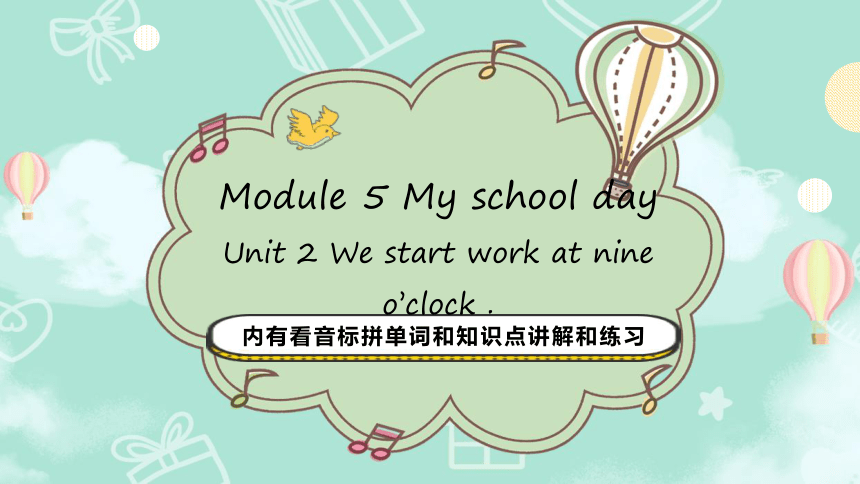 | |
| 格式 | pptx | ||
| 文件大小 | 23.9MB | ||
| 资源类型 | 教案 | ||
| 版本资源 | 外研版 | ||
| 科目 | 英语 | ||
| 更新时间 | 2021-10-22 20:40:08 | ||
图片预览

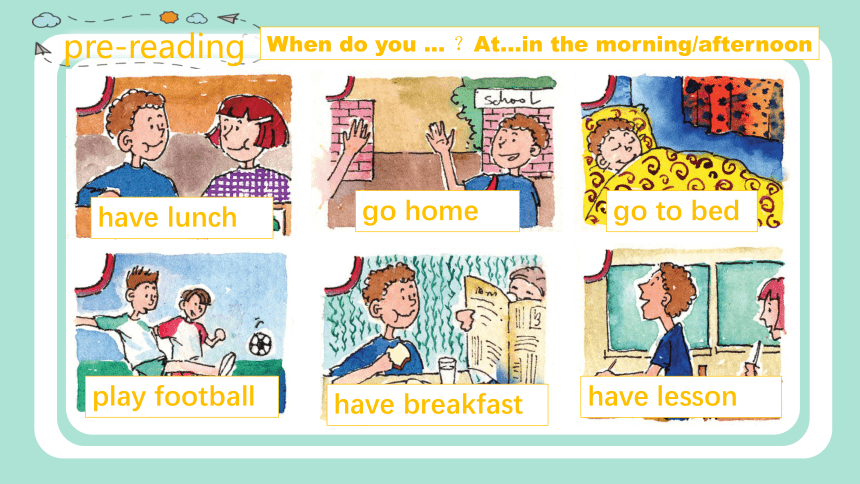
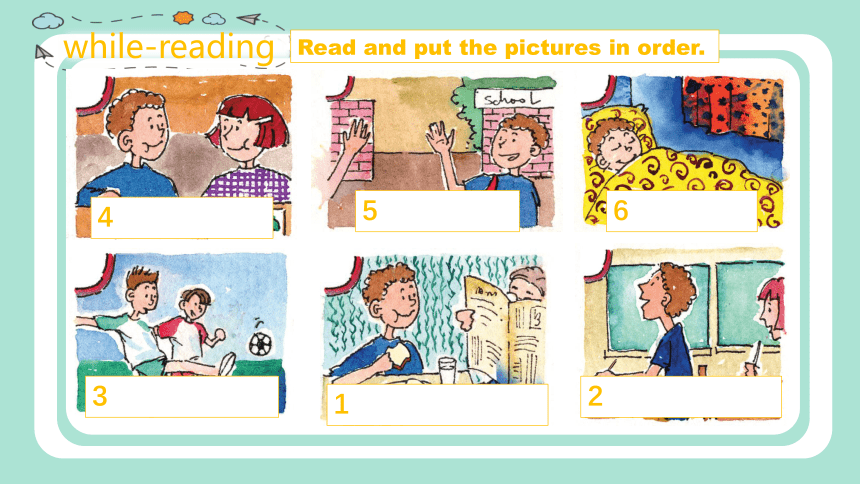
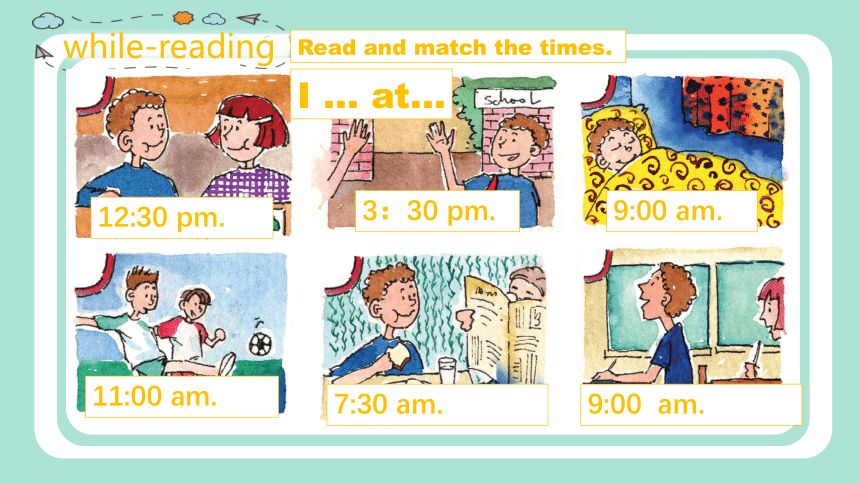
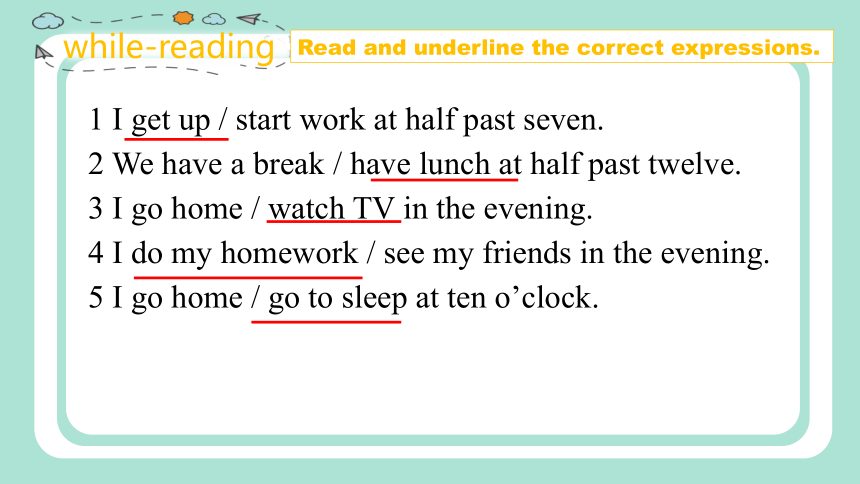
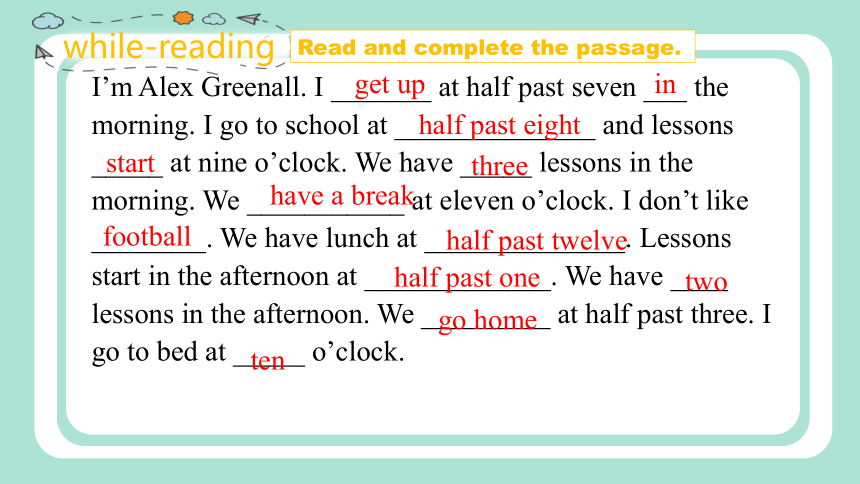
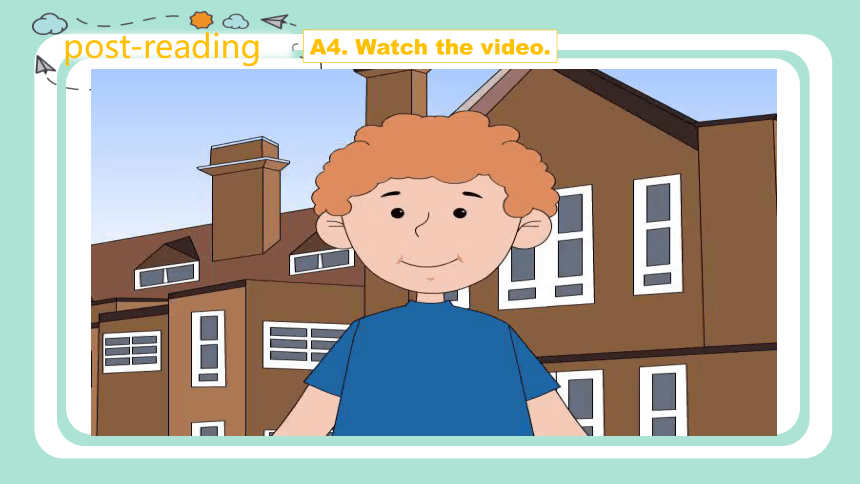
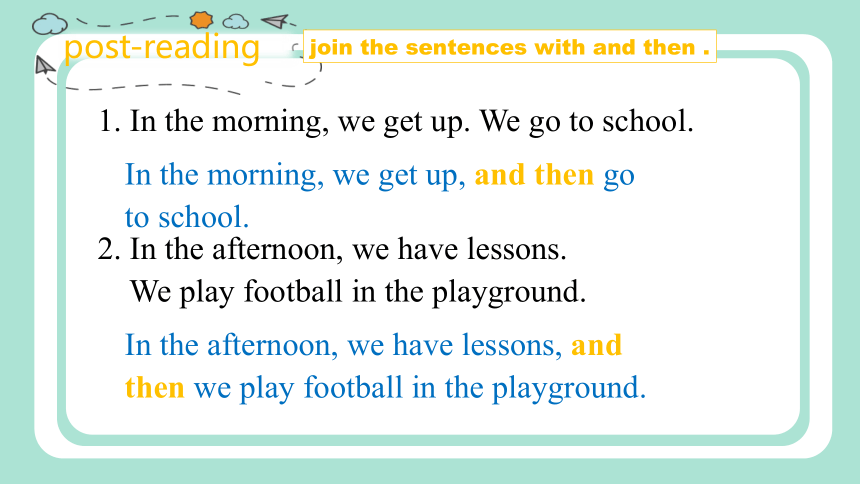
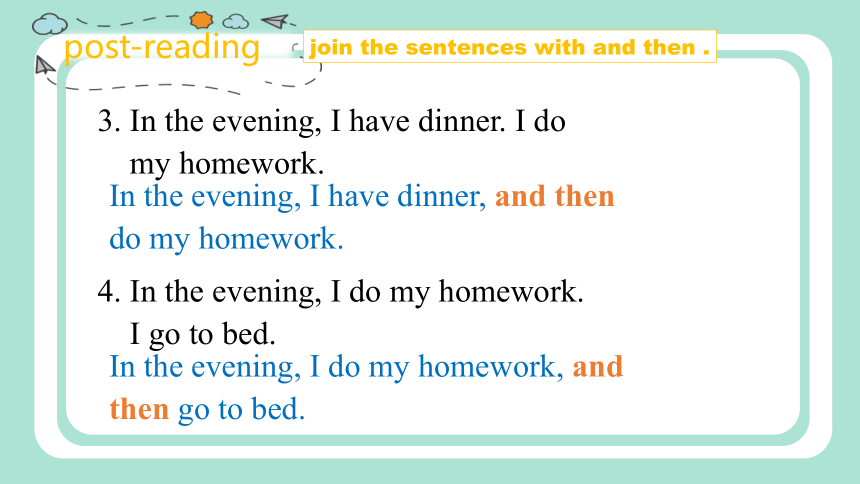
文档简介
(共22张PPT)
内有看音标拼单词和知识点讲解和练习
Module 5 My school day
Unit 2 We start work at nine o’clock .
pre-reading
When do you ... ?At...in the morning/afternoon
have lunch
go home
go to bed
play football
have breakfast
have lesson
while-reading
Read and put the pictures in order.
4
5
6
3
1
2
while-reading
Read and match the times.
12:30 pm.
3:30 pm.
9:00 am.
11:00 am.
7:30 am.
9:00 am.
I ... at...
while-reading
Read and underline the correct expressions.
1 I get up / start work at half past seven.
2 We have a break / have lunch at half past twelve.
3 I go home / watch TV in the evening.
4 I do my homework / see my friends in the evening.
5 I go home / go to sleep at ten o’clock.
I’m Alex Greenall. I _______ at half past seven ___ the morning. I go to school at ______________ and lessons _____ at nine o’clock. We have _____ lessons in the morning. We ___________ at eleven o’clock. I don’t like ________. We have lunch at ______________. Lessons start in the afternoon at _____________. We have ____ lessons in the afternoon. We _________ at half past three. I go to bed at _____ o’clock.
get up
in
half past eight
start
three
have a break
football
half past twelve
half past one
two
go home
ten
while-reading
Read and complete the passage.
post-reading
A4. Watch the video.
post-reading
join the sentences with and then .
1. In the morning, we get up. We go to school.
2. In the afternoon, we have lessons.
We play football in the playground.
In the morning, we get up, and then go to school.
In the afternoon, we have lessons, and then we play football in the playground.
post-reading
join the sentences with and then .
3. In the evening, I have dinner. I do
my homework.
4. In the evening, I do my homework.
I go to bed.
In the evening, I have dinner, and then do my homework.
In the evening, I do my homework, and then go to bed.
1. I get up at half past seven in the morning, and then have breakfast.
get up是一个固定搭配,意为“起床” 。如:
What time do you get up 你几点起床?
I get up at six every morning.每天早上我六点钟起床。
[拓展]get up还有“站起, 起立”之意,相当于stand up。如:
All the students get up.所有的学生都站起来了。
The class got up when the teacher came in.
老师进来时全班起立。
post-reading
Language points
get up
get / stand up
1. 他们早上7点半起床。
They _______ _______ at half past seven in the morning.
2. 请站起来。Please ________ ________.
and then 相当于一个副词,意思是“于是,然后”。如:
Let’s go for a drink and then go home.
我们先去喝一杯然后再回家。
Read the text first and then explain the new words.
先读课文,然后解释生词。
post-reading
Language points
2. Then we go home at half past three.
then用作副词,表示“那是,然后,当时”。
Then he went back to his seat.然后他回到座位上去。
His dog nosed me, and then let me go in.
他的狗闻了闻我,然后放我进去了。
then, and then的区别:
二者都表示“然后,于是”,都起着副词的作用,只是在语气上and then更强调前后两个事物时间上联系得更紧密些,and then可以引导并列句,then则不行。
He came here and then he left. He came here. Then, he left.
post-reading
Language points
go home是一个固定搭配,意为“回家”。因为home在这里作副词, 故home的前面不能加介词to。如:
We go home at half past three. 我们3点半回家。
[拓展]go to school表示“去上学”, go to work表示“去上班”, go to bed表示“去睡觉”。如:
In the evening, I go home and have dinner.
Students go to school at 8 o’clock in the morning.
My Mum and Dad go to work by bus in the morning.
post-reading
Language points
3. We start lessons in the afternoon at half past one.
start作及物动词时,意为"开始;着手",后面可直接接名词或代词作宾语;start也常用于"start to do sth. "或"start doing sth."结构中,意为"开始做某事"。如:
I start my work at nine o’clock every day.
我每天九点开始工作。
When did you start to learn English
你什么时候开始学英语的?
post-reading
Language points
start也可用作名词, 意为“开始;开端”。如:
The start of the film is very interesting.
电影的开头非常有趣。
用所给单词的适当形式填空。
1. The first class _________(start) at eight o’clock.
2. My brother started _________________ (play) football when he was ten years old.
starts
playing / to play
post-reading
Language points
/'wi:kde /
/ha s/
/stɑ:t/
/w :k/
/'i:vn /
/w t /
/bre k/
/'h mw :k/
/bed/
/sli:p/
/pɑ:k/
weekday
house
start
work
evening
watch
break
homework
bed
sleep
park
n. 平日,工作日
n.房子、住宅
vt. 开始;启动
n. 工作,学习; v. 工作,学习
n. 晚上;傍晚
vi. 观看,看。
n. (课间)休息,
n. 家庭作业,课外作业
n. 床;
vi. 睡觉。n. 睡觉
n. 公园;停车场
/'b zi/
/w /
/fe s/
/'m n t/
busy
wash
face
minute
adj. 忙碌的;繁忙的
vt. 洗涤;洗
n.脸;表面;外表v.面对
n. 分,分钟
1. 起床__________________________
2. 在7点30分_____________________
3. 早餐__________________________
4. 在…旁边______________________
5. 去上学________________________
6. 上课__________________________
7. 课间休息______________________
8. 与我的朋友交谈_______________
9. 去游乐场______________________
10. 踢足球_______________________
get up
at half past seven
have breakfast
next to
go to school
have lessons
have a break
talk to my friends
go to the playground
play football
11. 吃午饭____________________
12. 在食堂____________________
13. 吃肉和大米________________
14. 回家______________________
15. 看电视____________________
16. 吃晚饭____________________
17. 做功课____________________
18. 上床睡觉__________________
19. 在上午____________________
20. 在下午___________________
21. 在晚上____________________
have lunch
in the dining hall
have meat and rice
go home
watch TV
have dinner
do one’s homework
go to bed
in the morning
in the afternoon
in the evening
Complete the time line and write about your schoolday.
7:30
3:30
11:00
1:30
12:30
8:30
9:00
10:00
get up
Homework:
Level A: Write an article about your school timetable.
Level B: Get ready to make a speech about
your ideal schooltetable .
Bye !
内有看音标拼单词和知识点讲解和练习
Module 5 My school day
Unit 2 We start work at nine o’clock .
pre-reading
When do you ... ?At...in the morning/afternoon
have lunch
go home
go to bed
play football
have breakfast
have lesson
while-reading
Read and put the pictures in order.
4
5
6
3
1
2
while-reading
Read and match the times.
12:30 pm.
3:30 pm.
9:00 am.
11:00 am.
7:30 am.
9:00 am.
I ... at...
while-reading
Read and underline the correct expressions.
1 I get up / start work at half past seven.
2 We have a break / have lunch at half past twelve.
3 I go home / watch TV in the evening.
4 I do my homework / see my friends in the evening.
5 I go home / go to sleep at ten o’clock.
I’m Alex Greenall. I _______ at half past seven ___ the morning. I go to school at ______________ and lessons _____ at nine o’clock. We have _____ lessons in the morning. We ___________ at eleven o’clock. I don’t like ________. We have lunch at ______________. Lessons start in the afternoon at _____________. We have ____ lessons in the afternoon. We _________ at half past three. I go to bed at _____ o’clock.
get up
in
half past eight
start
three
have a break
football
half past twelve
half past one
two
go home
ten
while-reading
Read and complete the passage.
post-reading
A4. Watch the video.
post-reading
join the sentences with and then .
1. In the morning, we get up. We go to school.
2. In the afternoon, we have lessons.
We play football in the playground.
In the morning, we get up, and then go to school.
In the afternoon, we have lessons, and then we play football in the playground.
post-reading
join the sentences with and then .
3. In the evening, I have dinner. I do
my homework.
4. In the evening, I do my homework.
I go to bed.
In the evening, I have dinner, and then do my homework.
In the evening, I do my homework, and then go to bed.
1. I get up at half past seven in the morning, and then have breakfast.
get up是一个固定搭配,意为“起床” 。如:
What time do you get up 你几点起床?
I get up at six every morning.每天早上我六点钟起床。
[拓展]get up还有“站起, 起立”之意,相当于stand up。如:
All the students get up.所有的学生都站起来了。
The class got up when the teacher came in.
老师进来时全班起立。
post-reading
Language points
get up
get / stand up
1. 他们早上7点半起床。
They _______ _______ at half past seven in the morning.
2. 请站起来。Please ________ ________.
and then 相当于一个副词,意思是“于是,然后”。如:
Let’s go for a drink and then go home.
我们先去喝一杯然后再回家。
Read the text first and then explain the new words.
先读课文,然后解释生词。
post-reading
Language points
2. Then we go home at half past three.
then用作副词,表示“那是,然后,当时”。
Then he went back to his seat.然后他回到座位上去。
His dog nosed me, and then let me go in.
他的狗闻了闻我,然后放我进去了。
then, and then的区别:
二者都表示“然后,于是”,都起着副词的作用,只是在语气上and then更强调前后两个事物时间上联系得更紧密些,and then可以引导并列句,then则不行。
He came here and then he left. He came here. Then, he left.
post-reading
Language points
go home是一个固定搭配,意为“回家”。因为home在这里作副词, 故home的前面不能加介词to。如:
We go home at half past three. 我们3点半回家。
[拓展]go to school表示“去上学”, go to work表示“去上班”, go to bed表示“去睡觉”。如:
In the evening, I go home and have dinner.
Students go to school at 8 o’clock in the morning.
My Mum and Dad go to work by bus in the morning.
post-reading
Language points
3. We start lessons in the afternoon at half past one.
start作及物动词时,意为"开始;着手",后面可直接接名词或代词作宾语;start也常用于"start to do sth. "或"start doing sth."结构中,意为"开始做某事"。如:
I start my work at nine o’clock every day.
我每天九点开始工作。
When did you start to learn English
你什么时候开始学英语的?
post-reading
Language points
start也可用作名词, 意为“开始;开端”。如:
The start of the film is very interesting.
电影的开头非常有趣。
用所给单词的适当形式填空。
1. The first class _________(start) at eight o’clock.
2. My brother started _________________ (play) football when he was ten years old.
starts
playing / to play
post-reading
Language points
/'wi:kde /
/ha s/
/stɑ:t/
/w :k/
/'i:vn /
/w t /
/bre k/
/'h mw :k/
/bed/
/sli:p/
/pɑ:k/
weekday
house
start
work
evening
watch
break
homework
bed
sleep
park
n. 平日,工作日
n.房子、住宅
vt. 开始;启动
n. 工作,学习; v. 工作,学习
n. 晚上;傍晚
vi. 观看,看。
n. (课间)休息,
n. 家庭作业,课外作业
n. 床;
vi. 睡觉。n. 睡觉
n. 公园;停车场
/'b zi/
/w /
/fe s/
/'m n t/
busy
wash
face
minute
adj. 忙碌的;繁忙的
vt. 洗涤;洗
n.脸;表面;外表v.面对
n. 分,分钟
1. 起床__________________________
2. 在7点30分_____________________
3. 早餐__________________________
4. 在…旁边______________________
5. 去上学________________________
6. 上课__________________________
7. 课间休息______________________
8. 与我的朋友交谈_______________
9. 去游乐场______________________
10. 踢足球_______________________
get up
at half past seven
have breakfast
next to
go to school
have lessons
have a break
talk to my friends
go to the playground
play football
11. 吃午饭____________________
12. 在食堂____________________
13. 吃肉和大米________________
14. 回家______________________
15. 看电视____________________
16. 吃晚饭____________________
17. 做功课____________________
18. 上床睡觉__________________
19. 在上午____________________
20. 在下午___________________
21. 在晚上____________________
have lunch
in the dining hall
have meat and rice
go home
watch TV
have dinner
do one’s homework
go to bed
in the morning
in the afternoon
in the evening
Complete the time line and write about your schoolday.
7:30
3:30
11:00
1:30
12:30
8:30
9:00
10:00
get up
Homework:
Level A: Write an article about your school timetable.
Level B: Get ready to make a speech about
your ideal schooltetable .
Bye !
同课章节目录
- Starte
- Module 1 My teacher and my friends
- Module 2 My English lesson
- Module 3 My English book
- Module 4 My everyday life
- Module 1 My classmates
- Unit 1 Nice to meet you.
- Unit 2 I'm Wang Lingling and I'm thirteen years ol
- Unit 3 Language in use.
- Module 2 My family
- Unit 1 Is this your mum?
- Unit 2 These are my parents.
- Unit 3 Language in use.
- Module 3 My school
- Unit 1 There are thirty students in my class.
- Unit 2 The library is on the left of the playgroun
- Unit 3 Language in use.
- Module 4 Healthy food
- Unit 1 We've got lots of apples.
- Unit 2 Is your food and drink healthy?
- Unit 3 Language in use.
- Module 5 My school day
- Unit 1 I love history.
- Unit 2 We start work at nine o'clock.
- Unit 3 Language in use.
- Revision module A
- Module 6 A trip to the zoo
- Unit 1 Does it eat meat?
- Unit 2 The tiger lives in Asia.
- Unit 3 Language in use.
- Module 7 Computers
- Unit 1 How do I write my homework on the computer?
- Unit 2 When do you use a computer?
- Unit 3 Language in use.
- Module 8 Choosing presents
- Unit 1 I always like birthday parties.
- Unit 2 She often goes to concerts.
- Unit 3 Language in use.
- Module 9 People and places
- Unit 1 We're enjoying the school trip a lot.
- Unit 2 They're waiting for buses or trains.
- Unit 3 Language in use.
- Module 10 Spring Festival
- Unit 1 Are you getting ready for Spring Festival?
- Unit 2 My mother's cleaning our houses and sweepin
- Unit 3 Language in use.
- Revision module B
